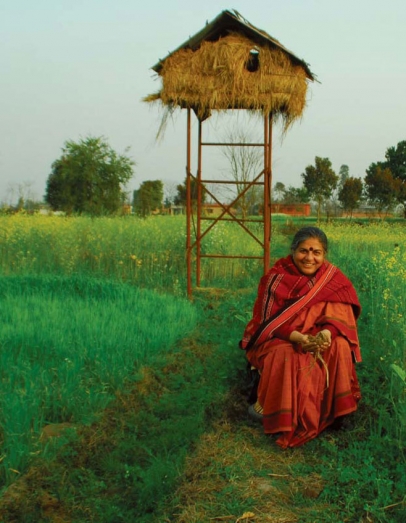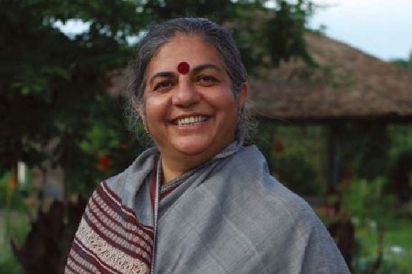Dr. Vandana Shiva Cultivates Message of Diversity, Freedom, and Hope
“We need a new paradigm for living on the earth because the old one is clearly not working.”
– Dr. Vandana Shiva
Dr. Vandana Shiva is a physicist, ecologist, activist, and author who is changing the way the world thinks about food, agriculture, and sustainability. She has become a leader in the worldwide battle over genetically modified seeds, fighting to raise awareness about the risks of genetically modified organisms (GMOs) and the devastating impact they have on the health of the planet and the livelihood of farmers.
Having grown up as an ecologist, Dr. Shiva recognized the importance of diversity of species, but her studies of nuclear physics and quantum theory led her to understand the underlying interconnectedness of everything. This framework contradicts the idea that everything is hard matter and unrelated to each other, a paradigm that still guides most science and economics, including genetic modification and commoditization of seeds.
Seed is at the heart of Dr. Shiva’s work–her work with small farmers in India to establish community seed banks and her challenging of corporate monopolization of seed by global companies such as Monsanto. Dr. Shiva explains, “It comes down to seeds for the simple reason that everything begins a seed. The food on our plate. You and I were seed at one point. The little calf that becomes the cow. Seed is the source of life. And seed is the source of renewal of life.”
In response to diminishing biodiversity of seeds in India as a result of corporate control of agriculture, Dr. Shiva founded Navdanya, a participatory research initiative for farming which protects biodiversity, the Earth, and small farmers.
Navdanya means ‘nine crops’ – the crops that represent India’s collective source of food security. The organization works to support local farmers and to rescue and conserve crops and plants that are being pushed to extinction by making them available through direct marketing. Navdanya is also actively involved in the rejuvenation of indigenous knowledge and culture; it has created awareness of the hazards of genetic engineering, defended people’s knowledge from bio-piracy, and defended food rights in the face of globalization.
Navdanya is a network of seed savers and organic producers spread across 17 states in India. Navdanya has helped set up 111 community seed banks across the country, trained over 500,000 farmers in seed sovereignty, food sovereignty and sustainable agriculture over the past two decades, and helped set up the largest direct marketing, fair trade, organic network in the country.
These small farmers and their peers around the world produce seventy percent of the food of the world. They are the evidence that refutes the common argument that we need GMOs and industrial-scale farms to feed the growing population of the world. Dr. Shiva reminds us, “We forget the scale of what smallness means multiplied many times, because we’ve gotten used to the dinosaur mentality. We only see the big. We forget that dinosaurs go extinct.”
The dinosaur mentality of agribusiness has penetrated deep into India’s farmland and driven out the small farmer, starting with the Green Revolution of 1968. Purportedly intended to save millions of people from starvation, the Green Revolution introduced high-yielding varieties of grains, modern farm equipment, and synthetic fertilizers and pesticides to subsistence farmers. Since then agricultural biodiversity has continued to dwindle with the introduction of GMOs and Monsanto’s privatization of seeds through intellectual property right patents. Monsanto now controls 95 percent of the cotton and 90 percent of the soy in India, and they’ve taken over most of the seed companies of the world.
If the Green Revolution provided a solution to hunger, how is it possible that nearly 870 million people, or one in eight, suffer from chronic undernourishment? (FAO 2012). “In my view, hunger is part of the design of the green revolution, a design for scarcity,” Dr. Shiva writes in her most recent book, “Making Peace with the Earth”.
“Making Peace with the Earth” outlines the ways in which international policies, heavily influenced by global companies such as Monsanto and Cargill, have intentionally created hunger in India and around the world. Policies established as a result of the Green Revolution turned food into a global commodity, rather than a local resource for nourishing the community. Dr. Shiva writes, “The world’s commodity trading has no relationship to food, to its diversity, to its growers or eaters, to the seasons, to sowing or harvesting. Food diversity is reduced to eight commodities and bundled into ‘composite price indices’ … The tragedy is that this unreal world is creating hunger for real people in the real world.” Commodity trading controls food prices on a global scale; in recent years food prices have spiked again resulting in decreased access for those living in poverty.
In addition to spiking food prices, this commodity-driven agricultural market has turned land and resources that once fed Indian communities and rural communities worldwide into production for global trade.
Some argue that globalization – the movement of ideas, of people, of money, and of food across arbitrary boundaries – also reflects the interconnectedness of everything that Dr. Shiva believes is the basis of solving this crisis. Her response is that this is not interconnectedness of the ecological level. She says, “All that’s flowing around is commodities – commodities that don’t have to be moving. … That flow is not a flow of interconnectedness. And in fact, it is leading to a disconnection if you look at the violence being perpetuated.”
Dr. Shiva points out that we are seeing deeper and deeper divisions between human beings and the Earth, which results in a collapse of consciousness about our relationship with the planet. It results in hunger by design.
In order to redesign the system to provide abundant nourishment for all, we need active engagement of all citizens. We each need to be part of building food democracy. We each have the right, the responsibility, and the power to determine food policies and practices, locally and globally, which ensure all people have access to healthy and justly raised food. We are all food democrats.
Food democracy starts with awareness. It starts with paying attention to our food. What are we eating? Where did it come from? How did it get to our plates? Who grew it? Where did the seed come from? Knowing the answer to these questions begins to reconnect us to our food. Caring about the answers to these questions reconnects us to the Earth and to each other.
Food democracy is about people becoming educated about food. It is about learning from each other, from experts, from daily observation, and from thinking and analysis. It is about having real conversations about food – especially ones that confront issues we don’t like to think about in relationship to our food – with our family, friends, neighbors and communities.
Food democracy is about people having the ability and the power to act on this knowledge – to overcome barriers between the current food system and a vision of a good food world.
Finally, food democracy is about action. It is about changing the way you eat. It is about changing the way we feed our children in school. It is about planting seeds and becoming gardeners, farmers, and keepers of chicks and bees. It is about becoming food educators, food writers, and food activists.
Food democracy is about people, each and every one of us, learning, engaging, and acting in our food system. This will reconnect us with the earth. This will reconnect us with each other. Food democracy will create nourishment by design, rather than the hunger by design of our current industrially dominated food system.
Dr. Shiva encourages each of us to ask ourselves daily, “Where am I complicit in a war against the Earth? Where are my daily actions a part of a devastation of the planet and with it, a devastation of the lives of people?” Food is an aspect of life we can all begin to change toward cultivating a more diverse and hopeful future.
Cultivate Kansas City and the University of Missouri – Kansas City’s Environmental Studies Program and Department of Architecture + Urban Planning + Design invite you to join Dr. Vandana Shiva in Kansas City on Thursday, April 17 to hear her address “Cultivating Diversity, Freedom and Hope.” Event details and tickets available at www.cultivatekc.org.





